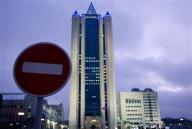 KIEV/MOSCOW (Reuters) – Russian gas flows to four European Union countries dipped below normal on Saturday after Moscow cut off supplies to Ukraine in a pricing row, and there were no talks in sight to resolve the dispute.
KIEV/MOSCOW (Reuters) – Russian gas flows to four European Union countries dipped below normal on Saturday after Moscow cut off supplies to Ukraine in a pricing row, and there were no talks in sight to resolve the dispute.
Temperatures were under zero overnight in Europe, and Bulgaria’s Bulgargaz joined energy firms in Poland, Romania and Hungary in saying they had noted falls in supply, though flows to Europe’s biggest economy, Germany, were not affected.
The European Union, which gets a fifth of its gas from pipelines that cross Ukraine, said it would call a crisis meeting of envoys in Brussels on Monday and demanded that transit and supply contracts be honored.
It also urged both sides to reach an agreement soon, but added that it did not intend to become a mediator and that the bloc had sufficient gas reserves for now.
The prospects of a swift settlement to the row appeared remote as Russian gas monopoly Gazprom said President Dmitry Medvedev had approved its move to take Ukraine to the arbitration court in Stockholm over gas transit to Europe.
Moscow alleged Kiev was stealing gas intended for Europe and playing political games. Ukraine accused Russia of using “energy blackmail” and of not providing enough gas for the proper functioning of the transit system.
Three years after a similar dispute briefly disrupted supplies, European fears of gas flows dropping off in the dead of winter were once again becoming a reality — and Russia’s reputation as a reliable gas supplier was under new scrutiny.
Russia halted all supplies to Ukraine on New Year’s Day in what it called a purely commercial dispute.
But in the background is a fierce disagreement over a drive by Kiev’s pro-Western leaders to join NATO and Ukraine’s strong support of Tbilisi during Russia’s war with Georgia last year.
Poland, which had earlier reported a drop in Russian supplies, said deliveries via Ukraine were now down 11 percent. Hungary said pressure in its pipeline from Ukraine had recovered slightly but was still below normal levels.
Gazprom said it was increasing deliveries to Europe by 52 million cubic meters per day, about 16 percent, but said its ability to compensate for the fuel lost on the Ukrainian route was limited.
The extra deliveries were being pumped around Ukraine — through Belarus and Turkey — and from underground storage facilities in Europe.
Gazprom said Kiev was not ready to resume talks. “They are not negotiating because there is nobody to negotiate. It looks like they are not thinking about their own country, just playing political games,” said Gazprom deputy CEO Alexander Medvedev.
RULES OF Behavior
Medvedev had talks with officials in the Czech Republic, holder of the EU’s rotating presidency, just hours after a delegation from Ukraine had also been there to lobby for European support.
“Europe must be interested in helping to solve the dispute as quickly as possible … What we need from the EU is their help to persuade Ukraine to follow the rules of behavior at the negotiating table,” Medvedev told Reuters in an interview.
Ukraine, already reeling from the effects of the global financial crisis, denied it was stealing gas intended for Europe and instead alleged Gazprom had itself cut flows via Ukraine.
“Gazprom’s position breaches international practices of holding negotiations … and amounts to energy blackmail,” Ukrainian state energy firm Naftogaz said in a statement.
Naftogaz chief Oleh Dubyna said his officials were ready to go to Moscow at any moment to resume talks and sign a mutually acceptable deal.
The gulf between the two sides is vast. Russia said it was prepared to charge Ukraine $250 per 1,000 cubic meters this year before talks collapsed and now wants Kiev to pay $418. Dubyna said that price could tip Ukraine into a humanitarian crisis.
Dubyna also said that even if Ukraine agreed to pay $250 instead of the current $179.5, it would ask Moscow to raise gas transit fees it pays to Ukraine by 40 percent. Moscow says transit fees cannot be revised before 2010.
Naftogaz also said Moscow could choose to return to the old practice of paying for gas transit to Europe with gas instead of cash, which Medvedev described as “beyond commercial logic.”
European Union customers pay about $500 per 1,000 cubic meters of Russian gas, though that price is set to drop in line with the falling price of crude.
In Sofia, Bulgargaz CEO Dimitar Gogov said supply levels had not fallen below a critical level but further reductions could force the company to introduce restrictions for customers.
“The pipeline pressure has dropped and we are getting smaller deliveries as of Saturday morning,” Gogov told Reuters.
 Eurasia Press & News
Eurasia Press & News
